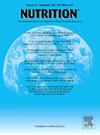Understanding health care professionals’ knowledge and practice regarding malnutrition and dysphagia: insights from Targeted Education to Address Malnutrition and Swallowing disorders (TEAMS) international survey
IF 3.2
3区 医学
Q2 NUTRITION & DIETETICS
引用次数: 0
Abstract
Objective
To understand the current knowledge gaps regarding malnutrition and dysphagia among healthcare professionals worldwide.
Design
An anonymous online cross-sectional survey was developed in English and translated into six languages. It comprised 26 questions divided into three categories: demographics, current clinical practice, and educational needs. Data were collected between July 2023 and January 2024.
Participants
Healthcare professionals and students involved in the care of dysphagia patients worldwide.
Analysis
Descriptive statistics and qualitative analysis.
Results
A total of 877 responses, predominantly from dietitians (44.3%) and speech therapists (29.2%) across 54 countries, were analyzed. Only about one-third of participants reported consistent nutrition screening and the use of validated tools. Nearly half (46%) indicated that less than 60% of malnourished dysphagia patients received interventions. The most common (22%) knowledge source was work experience, whereas clinicians’ knowledge was a key challenge in managing malnutrition in dysphagia patients.
Conclusions and Implications
Knowledge among international healthcare professionals on malnutrition and dysphagia may be inadequate, and there may be an underuse of validated tools for nutrition screening. These results call for the need to develop a targeted education program that addresses the current knowledge gap on malnutrition and dysphagia among healthcare professionals.
了解卫生保健专业人员关于营养不良和吞咽困难的知识和实践:来自针对性教育以解决营养不良和吞咽障碍(TEAMS)国际调查的见解
目的了解目前世界范围内卫生保健专业人员关于营养不良和吞咽困难的知识差距。设计一项匿名在线横断面调查是用英语开发的,并被翻译成六种语言。它包括26个问题,分为三类:人口统计、当前临床实践和教育需求。数据收集于2023年7月至2024年1月。参与者:世界范围内参与吞咽困难患者护理的医疗保健专业人员和学生。分析描述性统计和定性分析。结果共分析了来自54个国家的877份回复,主要来自营养师(44.3%)和语言治疗师(29.2%)。只有大约三分之一的参与者报告了一致的营养筛查和有效工具的使用。近一半(46%)的人表示,不到60%的营养不良吞咽困难患者接受了干预。最常见(22%)的知识来源是工作经验,而临床医生的知识是管理吞咽困难患者营养不良的关键挑战。结论和意义国际卫生保健专业人员对营养不良和吞咽困难的了解可能不足,并且可能没有充分使用经过验证的营养筛查工具。这些结果呼吁有必要制定一个有针对性的教育计划,以解决目前卫生保健专业人员在营养不良和吞咽困难方面的知识差距。
本文章由计算机程序翻译,如有差异,请以英文原文为准。
求助全文
约1分钟内获得全文
求助全文
来源期刊

Nutrition
医学-营养学
CiteScore
7.80
自引率
2.30%
发文量
300
审稿时长
60 days
期刊介绍:
Nutrition has an open access mirror journal Nutrition: X, sharing the same aims and scope, editorial team, submission system and rigorous peer review.
Founded by Michael M. Meguid in the early 1980''s, Nutrition presents advances in nutrition research and science, informs its readers on new and advancing technologies and data in clinical nutrition practice, encourages the application of outcomes research and meta-analyses to problems in patient-related nutrition; and seeks to help clarify and set the research, policy and practice agenda for nutrition science to enhance human well-being in the years ahead.
 求助内容:
求助内容: 应助结果提醒方式:
应助结果提醒方式:


